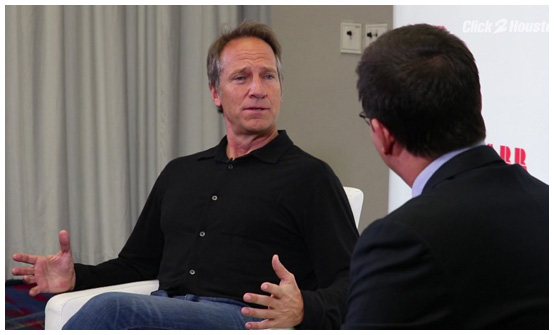 Last month, Mike Rowe, founder of Mike Rowe Works Foundation and formerly star of the Discovery Channel’s Dirty Jobs, was a keynote speaker at ABB Customer World, ABB Automation and Power Center’s premier customer event held at the George R. Brown Convention Center in Houston, TX. Afterwards, Owen Conflenti of Houston’s television station KPRC spoke with Rowe about his speech titled “The Future of Work.”
Last month, Mike Rowe, founder of Mike Rowe Works Foundation and formerly star of the Discovery Channel’s Dirty Jobs, was a keynote speaker at ABB Customer World, ABB Automation and Power Center’s premier customer event held at the George R. Brown Convention Center in Houston, TX. Afterwards, Owen Conflenti of Houston’s television station KPRC spoke with Rowe about his speech titled “The Future of Work.”
Conflenti asked Rowe what the next plateau for our workforce will be. Rowe said that he believes we will see a merging of the old models of “blue collar” and “white collar” jobs. Rowe said:
“I think we are going to see skill and workforce development become more ascendant and more important. I think liberal arts degrees will always be valuable, but at the moment they are simply too expensive. My message is almost always the same wherever I go: We are lending money we don’t have to kids who can’t pay it back, to train for jobs that don’t exist anymore. We’ve got 1½ trillion dollars of student loans on the books; we’ve got 7 million jobs that exist, the majority of which don’t require a 4-year degree. So we are caught in an old way of thinking about the definition of a good job.
“Whatever the future is, part of it will involve, I believe, a blending of skill and general knowledge [with] more affordable, broad-based, post-secondary education.”
Rowe said that we need to show students more examples of real people who have prospered as a result of learning a skilled trade.
Conflenti asked what Rowe thought about the “skills gap” where companies cannot find enough people who have the needed skills to fill jobs. Rowe answered that that doesn’t explain the whole picture. He said that it is also a “will gap.” He explained:
“It’s not just the idea that ‘We don’t have skilled workers.’ There is a drug issue, to be perfectly candid. A qualified candidate isn’t merely the candidate who has the skill. He or she is a candidate who shows up early, and stays late, and works with great enthusiasm, and who isn’t struggling with addiction. … It’s not just a lack of skill. It’s a lack of enthusiasm; it’s a lack of will. It’s not a lack of training either. The training is available. I work with companies all the time who have robust training programs in place. The struggle is finding people who possess the enthusiasm, and the character, and the desire to learn a skill that is in demand.”
Conflenti and Rowe talked about the role employers, industry leaders, media, and the general public have played in creating a disparity between expectations of young workers and the reality of their opportunities.
“It’s not the employer, it’s all of us. It’s the best-selling books on the shelf right now are books that teach you shortcuts. It’s the most popular TV shows that have ever been made show you how to become an American Idol – not over thirty years of sacrifice, but ‘right now, please, I’ll take it now, if it’s not too much to ask.’ It’s Madison Avenue; it’s Washington; it’s pop culture.”
Rowe went on to talk about the negative stereotypes that exist about what a plumber looks like: “Stereotypes, and stigmas, and images – and they are all rooted in fiction. It’s not true anymore. My foundation trains hundreds of people in these skilled trades, and over time, many of them go on to make six figures. But we still look at them as recipients of some vocational consolation prize.”
Rowe said he learned about hard work from his grandfather and his father. His grandfather dropped out of school in the 7th grade and went to work, eventually becoming an electrician and a plumber. His father worked for his grandfather, who lived next door. As a child, Rowe observed that each day his grandfather and father would leave for work clean and come home dirty, which caused Rowe to equate “dirt” with “fixing things.”
Rowe also talked about the role of robots and other new technologies. He said that they might change or replace certain jobs, but that they would never replace the number of humans needed to run our world.
You can watch the entire interview in the 16½-minute video below.
Mike Rowe Talks with Houston’s KPRC About the Skilled Trades Workforce
by Elizabeth McPherson | April 12, 2019


